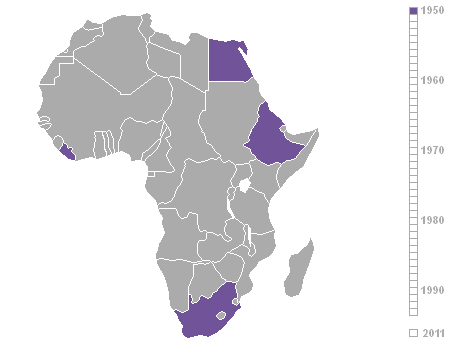|
Portuguese Wars In Africa
The Portuguese Colonial War ( pt, Guerra Colonial Portuguesa), also known in Portugal as the Overseas War () or in the Portuguese Empire, former colonies as the War of Liberation (), and also known as the Angolan, Guinea-Bissau and Mozambican War of Independence, was a 13-year-long conflict fought between Portuguese military history, Portugal's military and the emerging nationalist movements in Portugal's African colonies between 1961 and 1974. The Portuguese ultraconservative regime at the time, the , was overthrown by a military Carnation Revolution, coup in 1974, and the change in government brought the conflict to an end. The war was a decisive ideology, ideological struggle in Lusophone Africa, surrounding nations, and mainland Portugal. The prevalent Portuguese and international historical approach considers the Portuguese Colonial War as was perceived at the time—a single conflict fought in the three separate Angolan War of Independence, Angolan, Guinea-Bissau War of Ind ... [...More Info...] [...Related Items...] OR: [Wikipedia] [Google] [Baidu] |
Decolonisation Of Africa
The decolonisation of Africa was a process that took place in the Scramble for Africa, mid-to-late 1950s to 1975 during the Cold War, with radical government changes on the continent as Colonialism, colonial governments made the transition to Sovereign state, independent states. The process was often marred with violence, political turmoil, widespread unrest, and organised revolts in both northern and sub-Saharan countries including the Algerian War in French Algeria, the Angolan War of Independence in Portuguese Angola, the Congo Crisis in the Belgian Congo, the Mau Mau Uprising in Kenya Colony, British Kenya, the Zanzibar Revolution in the Sultanate of Zanzibar, and the Nigerian Civil War in the secessionist state of Biafra. Background The "Scramble for Africa" between 1870 and 1914 was a significant period of European imperialism in Africa that ended with almost all of Africa, and its natural resources, being controlled as colonies by a small number of European states. Racin ... [...More Info...] [...Related Items...] OR: [Wikipedia] [Google] [Baidu] |
FRELIMO
FRELIMO (; from the Portuguese , ) is a democratic socialist political party in Mozambique. It is the dominant party in Mozambique and has won a majority of the seats in the Assembly of the Republic in every election since the country's first multi-party election in 1994. Founded in 1962, FRELIMO began as a nationalist movement fighting for the self-determination and independence of Mozambique from Portuguese colonial rule. During its anti-colonial struggle, FRELIMO managed to maintain friendly relations with both the Soviet Union and China, and received military and economic assistance from both Moscow and Beijing. Independence was achieved in June 1975 after the Carnation Revolution in Lisbon the previous year. It formally became a political party during its 3rd Party Congress in February 1977, and adopted Marxism–Leninism as its official ideology and FRELIMO Party () as its official name. FRELIMO has ruled Mozambique since then, initially as the sole legal party in a on ... [...More Info...] [...Related Items...] OR: [Wikipedia] [Google] [Baidu] |
António Augusto Dos Santos
António Augusto dos Santos (January 22, 1929 - October 13, 2004) was a Portuguese General and commander of the Portuguese forces in Mozambique from 1964 until he was relieved of command at the end of 1969. On the outbreak of the Mozambican War of Independence in 1964, Augusto dos Santos commanded the Portuguese forces in that Portuguese territory and favored the use of African units trained by Portuguese regulars who fought alongside the Portuguese Army regulars. General Dos Santos believed in a hearts and minds campaign that resulted in the construction of schools and other infrastructure and the training of African Units to build partner capacity (a technique that is used today by the U.S. Military in Africa). He was relieved by General Kaúlza de Arriaga who took over in 1970 and demonstrated poorer success for the Portuguese in the counterinsurgency operations (Gordian Knot Operation) in that the scorched earth policy he pursued turned the people against him. For his efforts ... [...More Info...] [...Related Items...] OR: [Wikipedia] [Google] [Baidu] |
José Manuel Bettencourt Rodrigues
José is a predominantly Spanish and Portuguese form of the given name Joseph. While spelled alike, this name is pronounced differently in each language: Spanish ; Portuguese (or ). In French, the name ''José'', pronounced , is an old vernacular form of Joseph, which is also in current usage as a given name. José is also commonly used as part of masculine name composites, such as José Manuel, José Maria or Antonio José, and also in female name composites like Maria José or Marie-José. The feminine written form is ''Josée'' as in French. In Netherlandic Dutch, however, ''José'' is a feminine given name and is pronounced ; it may occur as part of name composites like Marie-José or as a feminine first name in its own right; it can also be short for the name ''Josina'' and even a Dutch hypocorism of the name ''Johanna''. In England, Jose is originally a Romano-Celtic surname, and people with this family name can usually be found in, or traced to, the English county of C ... [...More Info...] [...Related Items...] OR: [Wikipedia] [Google] [Baidu] |


